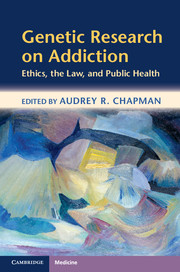Book contents
- Frontmatter
- Contents
- Contributors
- Preface
- Section 1 Introduction
- Section 2 Research ethics
- Section 3 Translating addiction research
- 11 The public health implications of genetic research on addiction
- 12 Genetics, addiction, and stigma
- 13 Lay beliefs about genetic influences on the development of alcoholism: Implications for prevention
- 14 Personalizing risk: How behavior genetics research into addiction makes the political personal
- Section 4 Conclusions
- Index
- References
12 - Genetics, addiction, and stigma
from Section 3 - Translating addiction research
Published online by Cambridge University Press: 05 September 2012
- Frontmatter
- Contents
- Contributors
- Preface
- Section 1 Introduction
- Section 2 Research ethics
- Section 3 Translating addiction research
- 11 The public health implications of genetic research on addiction
- 12 Genetics, addiction, and stigma
- 13 Lay beliefs about genetic influences on the development of alcoholism: Implications for prevention
- 14 Personalizing risk: How behavior genetics research into addiction makes the political personal
- Section 4 Conclusions
- Index
- References
Summary
This chapter aims to further our understanding of how genetic research and genetic explanations of alcoholism and other addictions may affect the stigma that is attached to addictions. Because we found practically no empirical research directly addressing the connections among genetic causal attributions, stigma, and addictions, we approach the chapter in the following way. First, we review key conceptual models of stigma, which address three basic questions: (1) What is stigma? How can stigma be defined? (2) What are the dimensions of stigma? How does stigma vary depending on the characteristic that is stigmatized and the circumstances in which it is encountered? (3) Why do we stigmatize? How does stigmatization benefit the dominant nonstigmatized group? Second, we review existing conceptual and empirical work concerning the stigmatization of addictions, focusing primarily on alcohol and substance dependence, and we discuss addictions in relation to each of the general conceptual models of stigma.
Next, we focus on the implications of genetic explanations and understandings of addictions (or the “geneticization” of addictions) for stigma. Here we focus first on theories that have implications for the connection between genetic causal attributions and stigma, and then on empirical research that has addressed the connection between genetic attributions and stigma for characteristics such as mental illness, obesity, sexual orientation, anorexia, stuttering, and cancer. Finally, we use the theoretical models and empirical findings to construct predictions concerning the likely impact of genetic attributions for stigma related to addictions.
- Type
- Chapter
- Information
- Genetic Research on AddictionEthics, the Law, and Public Health, pp. 174 - 194Publisher: Cambridge University PressPrint publication year: 2012
References
- 10
- Cited by



